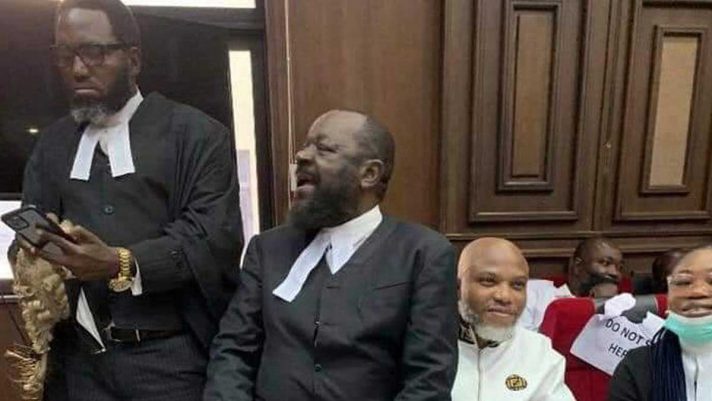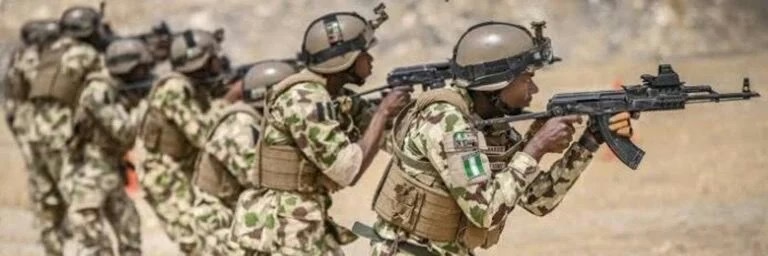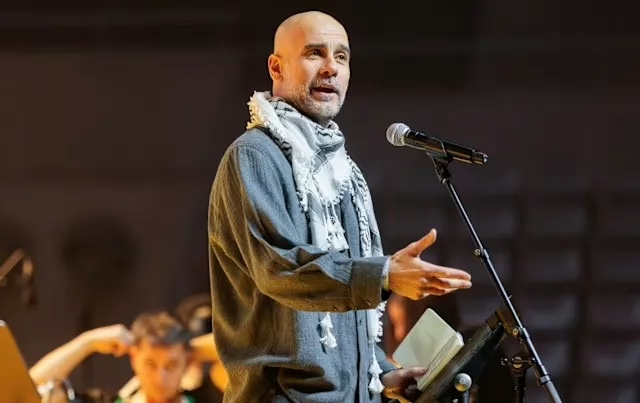The High Court of Abia State, yesterday, ordered the Federal Government to pay N1 billion compensation to the leader of the Indigenous People of Biafra (IPOB), Mazi Nnamdi Kanu, for the violation of his fundamental rights, including the illegal invasion of his country home in Afara Ukwu, Umuahia North L.G.A of the state in September 2017 by the military.
The trial judge, Benson Anya, additionally, ordered the government to render apology to Kanu for the trauma he went through.
Kanu, in the suit, had sought N5 billion compensation and apology from the government and urged the court to declare that the invasion of his home in September 2017 by the Nigerian military was illegal, unlawful, unconstitutional and amounts to infringement of his fundamental rights to life, dignity of his person, his personal liberty and fair hearing as guaranteed under the Nigerian Constitution and the African Charter on Human and People’s Rights.
The applicant also prayed the court to declare that his arrest in Kenya by agents of the Nigerian government without due process of law was arbitrary, illegal, unlawful, unconstitutional and amounts to infringement of his fundamental rights against arbitrary arrest, to his personal liberty and to fair hearing as guaranteed under the Nigerian Constitution and the African Charter on Human and People’s Rights.
The applicant further said his expulsion from Kenya to Nigeria by the Nigerian government and his consequent detention and prosecution in the suit marked FHC/ABJ/CR/383/2015 (Federal Republic of Nigeria v. Nnamdi Kanu) is illegal, unlawful, unconstitutional and amount to infringement of his fundamental rights.
But defendants raised preliminary objections to the jurisdiction of the state high court to entertain matters pertaining to the Federal Government.
Counsels for the respondents, namely Simon Enoch (for the Attorney General of the Federation), Omo Osagie (for the police), Amos Tori (for the Army) and Mrs. C. Odukwe for the DSS argued that the court lacked jurisdiction to hear the matter.
Tori specifically faulted Kanu for demanding N5 billion compensation from the Chief of Army Staff, instead of from the Army Council. But the court held that it has jurisdiction to hear the matter.
While delivering judgment yesterday in the matter, the judge condemned the invasion of Kanu’s family house by the military and described it as “notorious and brazen.”
Justice Anya, however, struck out Kanu’s prayers to declare his repatriation from Kenya and continued detention by the DSS as illegal.
The judge instead suggested to the authorities to explore political alternative in resolving the issues of his extradition, detention and trial.
REACTING to the judgment, the Nigerian Army says it will study the decision to know the next line of action. Counsel to the Army, Tori, reportedly said the military would respond appropriately to the court judgment that indicted it for violating the fundamental human rights of Kanu after studying the judgment.
At the same time, the IPOB leader in Abuja, yesterday, asked the Federal High Court, Abuja to discharge and acquit him of the 15-count criminal charges, which the Federal Government preferred against him.
Kanu rejected the charges during his arraignment in court yesterday, arguing that they were defective and have no force of law.
Besides the alleged defectiveness of the charges, he said the offences brought against him were committed in the United Kingdom (UK) outside the shores of Nigeria and pleaded not guilty to the charges.
Shortly after taking his plea, counsel to the Federal Government, Shuaib Magaji Labaran, told the trial Judge, Binta Nyako that he was ready to try the defendant.
He informed the court that two of his witnesses were present to testify in the case and that some exhibits were brought to court to establish terrorism charges against Kanu.
Labaran cited section 396 of the Administration of Criminal Justice Act (ACJA) 2015, which stipulated that trial should begin after arraignment, while objection on any issue could be taken at any time along with the substantive matters.
But Kanu’s lead counsel, Mike Ozekhome (SAN) objected to the commencement of trial, adding that his client had filed two motions on notice on the validity of the charges and a bail application.
Ozekhome said the two motions were fundamental, because one of them challenged the competence of the charges and should first be resolved, adding that Kanu desired to be discharged and acquitted without standing trial, because the charges were defective.
He argued that the second motion, which sought fresh bail for Kanu, was filed on Tuesday, January 18, 2022 and served on the prosecution on Wednesday, January 19, 2022 and therefore, not ripe for hearing.
In her ruling, Justice Nyako agreed with Ozekhome to first determine the motion challenging the validity of the charges and fixed February 16, 2022 for the parties to return to court and adopt their processes for and against the motion at 12:00 noon.
However, Kanu was returned to the Department of State Services (DSS) detention facility until his request for bail is resolved.
He was provided with orthopedic mattress, pillows and blankets, among others in compliance with the court order.
MEANWHILE, Kanu’s Special Counsel, Aloy Ejimakor, in a reaction to the judgment of the Abia High Court, said the President should obey the court’s decision on exploring political solution and prove that he indeed regards the judiciary as he said in an interview on January 5, 2022.
He said: “I am pleased with the judgment, especially as it diminished the vested notion that Nnamdi Kanu jumped bail in 2017. The directive by the judge to the Federal Government to pursue the path of political solution with Kanu is also in good order. Going forward, I see the judgment having significant impact on the Abuja case.
“I have no doubt that the Federal Government will implement the judgment. My confidence comes from the recent pronouncements from the President that he will respect whatever the judiciary decides in the matter of Nnamdi Kanu.”







Leave a Reply